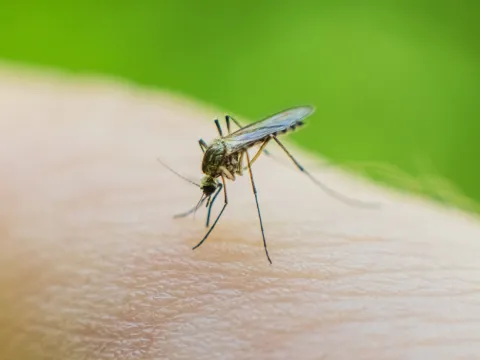- AdventHealth

Choose the health content that’s right for you, and get it delivered right in your inbox.
Recent news about increasing cases of triple E and the West Nile virus may leave you wondering if you should be concerned. Understanding the differences between the two viruses and how to protect yourself best can go a long way toward giving you peace of mind. Keep reading to get the facts.
What Is Triple E?
Eastern equine encephalitis, also known as triple E or EEE, is a rare virus spread by an infected mosquito. Because triple E is spread by mosquito bites, you’re more at risk if you spend a lot of time outdoors during the warmer months, particularly in wooded areas around dawn and dusk. You’re also at a higher risk if you live near the Gulf Coast, the Atlantic Ocean or the Great Lakes.
According to the latest data from the Centers for Disease Control and Prevention (CDC), 16 cases have developed in the United States so far in 2024, compared to an average of 11 cases per year. While these numbers may seem low overall, it’s important to stay alert because of how quickly the condition can develop — and worsen.
In mild cases, you may not experience symptoms. However, as the condition worsens, you will likely experience chills, fatigue, fever and joint and muscle pain. And if the infection reaches your brain, your symptoms may also include:
- Diarrhea
- Headache
- Loss of appetite
- Mood changes
- Seizures
- Vomiting
If you experience any of these symptoms, it’s crucial to talk to your health care provider right away or seek urgent medical care.
What is the West Nile Virus?
West Nile virus is more common than triple E. In fact, the CDC notes it as “the leading cause of mosquito-borne disease in the continental United States.” And although it’s rare, you can get West Nile virus from another person through a blood transfusion or organ donation. It can also be passed from mother to baby during pregnancy.
Because the West Nile virus is spread by mosquitos, you’re more at risk if you spend a lot of time outdoors during the warmer months, particularly in wooded areas around dawn and dusk. However, contrary to popular belief, you can’t get West Nile virus from live or dead birds.
Most people with West Nile virus won’t experience any symptoms. But if you do, your symptoms may include:
- Diarrhea
- Fatigue
- Fever
- Headache
- Lack of appetite
- Muscle aches and stomach pain
- Rash
- Sore throat
- Vomiting
- Weakness
Since one in 150 people with West Nile virus develop a neurologic disease from the infection, such as meningitis or encephalitis, you should also watch out for more serious symptoms like:
- Confusion
- Convulsions
- Loss of vision
- Loss of muscle control
- Numbness
- Stiff neck
- Tremors
Talk to your health care provider right away or seek urgent medical care if you’re experiencing any symptoms.
Know How to Protect Yourself
Currently, there are no vaccines to prevent triple E or the West Nile virus, but there are steps you can take to protect yourself, including:
- Avoiding scented products: Mosquitos are attracted to sweat, perfumes, colognes and scented soaps and lotions.
- Being mindful of the time: Mosquitoes can be more active at dawn and dusk, late spring through early fall. If your area is experiencing an influx of mosquitoes, plan your time outside accordingly.
- Considering your clothes: If it's not too hot, wear pants, long socks, a long-sleeve shirt and a hat while outside. You might also consider treating your clothes with permethrin spray, which can usually be found at any store that sells camping equipment. Some retailers even sell pre-treated clothes. However, avoid spraying permethrin directly on your skin, as it can cause irritation.
- Getting rid of standing water in your yard: Mosquitoes breed in standing water. Rid your yard of flowerpots, fire pits, baby pools or bird baths that collect and hold rainwater. And if you have a pool, keep it clean.
- Turning on a fan: If you’re sitting outside, a small, battery-operated fan may be all you need to keep mosquitoes at bay since they aren’t strong enough to fly in a fan’s cross breeze.
- Using mosquito netting: You can use mosquito netting while sleeping outside or drape it over a stroller to protect small children.
- Wearing insect repellant: Insect repellant with DEET will provide the best defense against mosquitos.
Find Help When You Need It
At AdventHealth, it’s our goal to help you feel healthy and whole at every age and stage of life. If you have questions about viruses that are reported in the news or experience concerning symptoms that could be related to triple E or West Nile virus, we’re ready to help at an AdventHealth Centra Care location near you.


